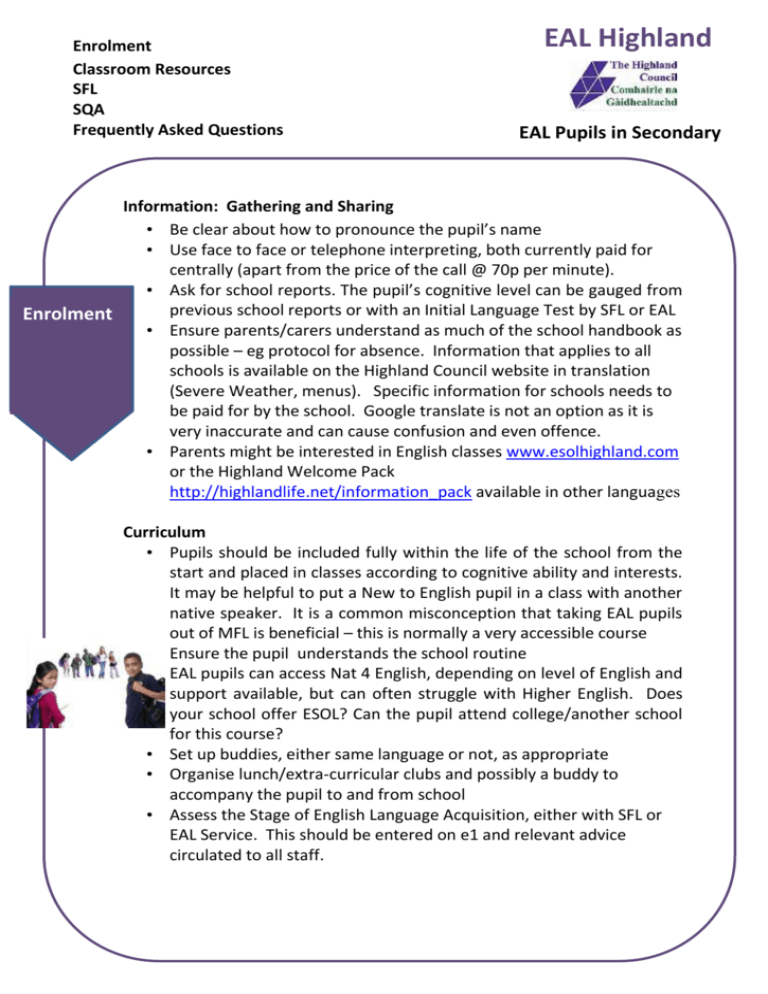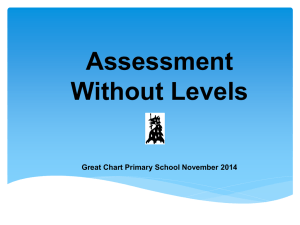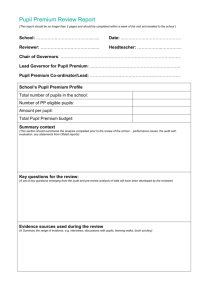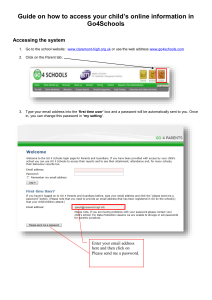EAL secondary schools information for all staff
advertisement

Enrolment Classroom Resources SFL SQA Frequently Asked Questions EAL Highland EAL Pupils in Secondary Information: Gathering and Sharing • Be clear about how to pronounce the pupil’s name • Use face to face or telephone interpreting, both currently paid for centrally (apart from the price of the call @ 70p per minute). • Ask for school reports. The pupil’s cognitive level can be gauged from previous school reports or with an Initial Language Test by SFL or EAL Enrolment • Ensure parents/carers understand as much of the school handbook as possible – eg protocol for absence. Information that applies to all schools is available on the Highland Council website in translation (Severe Weather, menus). Specific information for schools needs to be paid for by the school. Google translate is not an option as it is very inaccurate and can cause confusion and even offence. • Parents might be interested in English classes www.esolhighland.com or the Highland Welcome Pack http://highlandlife.net/information_pack available in other languages Curriculum • Pupils should be included fully within the life of the school from the start and placed in classes according to cognitive ability and interests. It may be helpful to put a New to English pupil in a class with another native speaker. It is a common misconception that taking EAL pupils out of MFL is beneficial – this is normally a very accessible course • Ensure the pupil understands the school routine • EAL pupils can access Nat 4 English, depending on level of English and support available, but can often struggle with Higher English. Does your school offer ESOL? Can the pupil attend college/another school for this course? • Set up buddies, either same language or not, as appropriate • Organise lunch/extra-curricular clubs and possibly a buddy to accompany the pupil to and from school • Assess the Stage of English Language Acquisition, either with SFL or EAL Service. This should be entered on e1 and relevant advice circulated to all staff. The EAL Highland Strategies Booklet has a wealth of strategies for each Stage of English. The SFL teacher (or EAL teacher) should tell you the pupil’s stage and you can select strategies to target progress. Many teachers use these strategies in class already. Classroom Resources Support in SFL • Booklet of subject specific vocabulary eg Word Bank published by Desktop Publications Ltd. OR • Subject Glossaries – dual language or English – get the pupil/family involved in translating these. Some are also available through EALHighland on GLOW • Subject specific visual dictionaries • Bilingual dictionary/ Easy Learner Dictionary/ Thesaurus • Visuals of key words displayed in the classroom • Websites to consolidate key words and concepts with strong visual content • Dual language texts eg readers from the library • Research and theory show that pupils make good progress through inclusion, therefore best practice is in allocating time for in-class support eg helping the pupil understand how to use bilingual dictionaries/glossaries etc to access the curriculum • Pupils who are Stage 1 may need some time in SFL. This should be negotiated with parents – again MFL is quite an accessible subject for EAL learners, therefore not necessarily the first choice to remove them from • If taking pupils out of class, take account of their cognitive ability – some EAL pupils develop low self-esteem if they are perceived as having an ASN • For Stage 1 pupils, use topic vocabulary resources eg www.mesenglish.com, Hounslow Secondary Starter (available from EAL) Concentrate on teaching letter names, numbers, money, time etc with lots of oral practice . See EALHighland Blog for more suggestions of websites and activities. https://blogs.glowscotland.org.uk/hi/EALHighlandBLOG/ • It is helpful to keep in touch with parents/carers to get an update on how things are going. Use an interpreter either by phone or face to face. SQA Alternative Arrangements for EAL 10 mins per hour extra time, if using a bilingual word for word dictionary Candidates who have English as an additional language are allowed to use a bilingual dictionary in both internal assessments and external examinations, with the exception of assessments in English, ESOL, and the candidate’s first language. SQA You must provide robust evidence of the candidate’s difficulty or additional support needs, how the requested assessment arrangement meets these needs, and evidence that the arrangement requested reflects the candidate’s on-going additional support provided in class. Where a candidate’s first language is not English and they are sitting an unfamiliar Modern Language, they would also be allowed the use of a native language/modern language dictionary in all papers (eg French/Polish dictionary) http://www.sqa.org.uk/sqa/files_ccc/AA_EnglishAdditionalLanguage.pdf If you feel a pupil’s attainment is hindered by their level of English, encourage use of a bilingual dictionary in class to build up evidence. In exceptional circumstances, eg if a pupil enters school in an exam year, it may be possible for them to use a dual language glossary in the exam. This needs to be submitted by the school for each subject to the SQA for approval. Please contact the EAL Service for support with this. ESOL is available from Nat 3 – Higher, with Access 2 – Int 2 diet available until 2015. Some universities accept Higher ESOL instead of Higher English. Teachers can gain professional recognition for teaching ESOL and there are training routes organised in Highland (Please contact the EAL service for more information) Frequently Asked Questions How long does it take for a pupil to become a fluent user of English? This can take from 5 to 11 years depending on a range of factors which include pupil motivation, age, level of competence in their home language, home language and previous educational experience. Are early stage learners sometimes silent for an initial period? Yes. Research shows that pupils who are new to English can sometimes take up to 6 months before gaining confidence to speak. It is important that you continue to speak to the pupil at every opportunity and give encouragement to any attempts at a response. Should the pupil be withdrawn for beginner English lessons? No. In the UK, teaching and learning through English as an Additional Language does not have a separate syllabus. It takes place in mainstream classrooms and the acquisition of English occurs across all the curricular subjects. Support for Learning or English as an Additional Language Support teachers may offer a short period of direct input to support English. Should the pupil be encouraged to speak in their first language during the lesson with one of their peers? Yes, the reinforcement and clarification of the learning in their first language will progress their cognitive skills and will also contribute to their English language development. More information www.educationscotland.gov.uk Learning in 2+ Languages Evaluating Education Provision for Bilingual Learners Count Us In Meeting the Needs of Young People newly Arrived in Scotland







